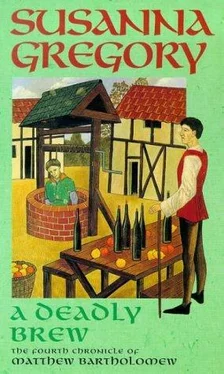Susanna Gregory - A Deadly Brew
Здесь есть возможность читать онлайн «Susanna Gregory - A Deadly Brew» весь текст электронной книги совершенно бесплатно (целиком полную версию без сокращений). В некоторых случаях можно слушать аудио, скачать через торрент в формате fb2 и присутствует краткое содержание. Год выпуска: 2013, Жанр: Исторический детектив, на английском языке. Описание произведения, (предисловие) а так же отзывы посетителей доступны на портале библиотеки ЛибКат.
- Название:A Deadly Brew
- Автор:
- Жанр:
- Год:2013
- ISBN:нет данных
- Рейтинг книги:5 / 5. Голосов: 1
-
Избранное:Добавить в избранное
- Отзывы:
-
Ваша оценка:
- 100
- 1
- 2
- 3
- 4
- 5
A Deadly Brew: краткое содержание, описание и аннотация
Предлагаем к чтению аннотацию, описание, краткое содержание или предисловие (зависит от того, что написал сам автор книги «A Deadly Brew»). Если вы не нашли необходимую информацию о книге — напишите в комментариях, мы постараемся отыскать её.
A Deadly Brew — читать онлайн бесплатно полную книгу (весь текст) целиком
Ниже представлен текст книги, разбитый по страницам. Система сохранения места последней прочитанной страницы, позволяет с удобством читать онлайн бесплатно книгу «A Deadly Brew», без необходимости каждый раз заново искать на чём Вы остановились. Поставьте закладку, и сможете в любой момент перейти на страницу, на которой закончили чтение.
Интервал:
Закладка:
‘I heard that considerable sums of money changed hands before Bingham finally secured the majority of votes,’ said Michael somewhat gleefully. ‘Rumour has it that James Grene, his rival, is bitterly resentful.’
‘It will not be easy for Bingham to rule Valence Marie if it is so divided,’ said Bartholomew, wondering whether such a feat would be even remotely possible given the plotting and intrigues that festered and bubbled, even when a College or hostel was in a state of relative harmony, let alone when there was a serious division among members.
‘Quite,’ said Michael smugly. ‘Another reason for declining the Chancellor’s generous offer to have Valence Marie handed to me on a plate — neither Grene nor Bingham would have allowed me to run the College without fighting me at every turn, because they would have deeply resented my appointment. And on top of their ambitions, Valence Marie remains in turmoil over the bones Thorpe found last year. Some of the Fellows still think that the hand he dredged from the King’s Ditch was that of a saint.’
‘Thorpe is in no position to benefit from their loyalty,’ said Bartholomew, thinking of how the aloof Master had been transferred to a post at an obscure grammar school to punish him for his foolish belief in the bones’ authenticity. The new post had been ‘offered’ by the King himself, leaving Thorpe no choice but to pack up his belongings and go.
They stood for a moment longer, thinking about Thorpe and his relic, and then entered Valence Marie through its handsome front gate — Bartholomew with reluctance, Michael with a growing enthusiasm, fired by the discussion of the uncertain, insalubrious world of University politics.
The physician had just handed his soggy cloak and the three bottles of poisoned wine — he could hardly take them with him to the festivities in the hall and then the church, and there was no time to take them to Michaelhouse first — to a curious porter, when a messenger arrived, leaning breathlessly against the doorjamb. He was one of a family of tinkers who lived near the river and whose family Bartholomew had recently treated for winter fever. The tinker’s sharp eyes darted everywhere, taking in the elegant tapestries that hung on the walls in the entrance hall and the highly polished brass handles on the doors. Bartholomew wondered if he were sizing it up for a future burglary. Apparently, the porter thought the same, for he bundled the tinker out of the door and demanded to know his business.
‘Doctor Bartholomew,’ said the tinker, ignoring the porter and addressing the physician. ‘You are needed urgently at Master Constantine Mortimer’s house. He has been struck down with pains in the stomach and asks that you attend him immediately.’
‘But he is not my patient,’ said Bartholomew. ‘He is in the care of Father Philius. Do you know Philius? He is Master of Medicine at Gonville Hall. You need to contact him, not me.’
‘You are far too honest,’ said Michael reprovingly. ‘Go to Mortimer, man! He is one of the wealthiest merchants in the town and a burgess, too. He will pay you handsomely for making you miss the installation. To the Devil with Philius!’
‘I know Philius,’ said the tinker. ‘But he is unwell himself, and Mistress Mortimer told me to fetch you instead. You had better hurry, because she told me she thought he might be dying.’
‘It seems you are destined not to see Master Bingham take his oath of allegiance to Valence Marie, Matt,’ said Michael, trying to rub away the spatters of mud that clung around the hem of his fine new habit. He straightened and gave Bartholomew a wink, leaning forward to whisper conspiratorially. ‘You can always just come for the food later. That will be the best part anyway. I have been told there will be roast boar!’
Bartholomew did not much mind the summons that took him from the tedious Latin investiture ceremony to attend a patient, grateful for the excuse to escape yet more of what was going to be a lengthy occasion. He retrieved his cloak from the porter, and followed the tinker to Milne Street, where many of the wealthy town burgesses had their homes. Most of them would have been invited to the installation, and Bartholomew was sure that Master Mortimer must be ill indeed to pass up the opportunity of rubbing shoulders with some of the most influential men in the town.
Activity in Milne Street was, as usual, frenetic. Raised voices yelled the prices of this and that, and goods were being carried from the barges moored at the wharves on the river to the great storerooms in the merchants’ yards. Bartholomew saw wooden crates filled with clanking bottles from France, while Mortimer’s own cellars were being loaded with bulging sacks of flour brought from the arable lands around Lincoln to the north. Among it all, gulls screamed and squabbled for the rubbish along the river banks, and a dog barked furiously at a teetering pile of cloth bales behind which a rat had fled. The rain seemed to have had little effect on trade, and bargemen and apprentices alike seemed oblivious to their dripping hoods and sodden clothes.
When Bartholomew looked behind him for the tinker, he had disappeared, and the physician wondered with irritation whether one of his students was playing some kind of practical joke — Master Mortimer the baker was a far cry from the town’s poor that Bartholomew usually treated. But as he pondered, glancing around to see if he could detect any watching undergraduates, a woman darted out of Mortimer’s house and seized his arm.
‘Thank you for coming,’ she said. ‘My husband says he is dying and Father Philius cannot attend because he has an ague. If you had not come, we might have had to ask Robin of Grantchester!’
Her horrified expression, and the hush in her voice as she uttered the name, bespoke the trepidation many people felt for Cambridge’s only surgeon. Unlike physicians, who were University educated, surgeons were mere craftsmen. Robin of Grantchester was an insanitary individual, whose habit of demanding payment before treatment, to avoid the trouble of suing bereaved next of kin in the event of sudden death, did little to inspire confidence in his skills. While the duties of physicians and surgeons overlapped, their techniques and expertise seldom did. Unusually for a physician, Bartholomew regularly performed a number of basic surgical operations, which led him into bitter confrontations, both with his fellow physicians who deplored the use of surgery and with Robin who felt his trade was being poached.
Katherine Mortimer gabbled at him as she led the way through the bakery and up a wide flight of stairs to the living quarters on the upper floor. She was a pleasant woman with a kindly face and sad blue eyes, whom Bartholomew had known for years and liked. In fact, he liked her a good deal more than her husband, whose short temper and brutish behaviour made him generally unpopular with townsfolk and scholars alike.
‘All the apprentices are busy unloading the flour,’ said Katherine, ‘so I had to pay that tinker to act as messenger when Constantine told me he was dying and that I should summon help. I told the tinker not to go to Michaelhouse, but straight to Valence Marie, since all the Fellows of the University will be there today for the celebrations … well, not you now, I suppose-’
‘How long has your husband been ill?’ asked Bartholomew, as soon as he could slip a few words into her almost continuous nervous babble.
‘Since mid-morning,’ she replied, leading him along an attractive corridor with a floor of polished wood and colourful paintings on the walls. At the end was a large, masculine room containing a massive bed surrounded by curtains of a deep red velvet and several damp, smelly dogs. The room was quiet, yet was filled with people, like that of a dying statesman. Bartholomew looked about him uneasily, uncomfortable at the notion of treating a patient in front of such a large audience. He saw the nursemaid with Mortimer’s younger children gathered about her, all regarding him with frightened faces; the household priest knelt in a corner, his lips moving as he spoke soundless prayers; and a huddle of men, clearly Mortimer’s foremen and chief bakers, stood near the glazed window holding their hats awkwardly in their hands.
Читать дальшеИнтервал:
Закладка:
Похожие книги на «A Deadly Brew»
Представляем Вашему вниманию похожие книги на «A Deadly Brew» списком для выбора. Мы отобрали схожую по названию и смыслу литературу в надежде предоставить читателям больше вариантов отыскать новые, интересные, ещё непрочитанные произведения.
Обсуждение, отзывы о книге «A Deadly Brew» и просто собственные мнения читателей. Оставьте ваши комментарии, напишите, что Вы думаете о произведении, его смысле или главных героях. Укажите что конкретно понравилось, а что нет, и почему Вы так считаете.












